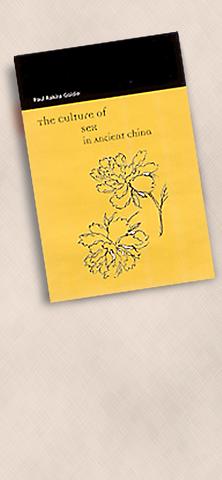This book is about the culture of sex, not sex itself. In other words, it is not about what people actually did (though it is hard to believe this can have been in any way different from what people do today) but how sex was represented in literature, mainly poetry.
What the author sets out to investigate is how the act of sex was used metaphorically. He also looks at the well-known concepts of yin and yang, and at how traditional Chinese medicine believed -- and of course still believes -- in the benefit to two lovers of an exchange of these complementary essences.

Early on he establishes his credentials as a Chinese specialist, taking to task, for example, the eminent feminist Julia Kristeva when she praises ancient Chinese sex manuals -- which were written exclusively for men -- for their stress on the woman's orgasm. He points out that this was not, as Kristeva assumes, because of any enlightened concern for female pleasure, but because of the medical belief that without an orgasm on the woman's part the yin essence would not be transferred successfully to the male partner.
In this context, homosexuality was not disapproved of as being a perversion, as was so often the case in the West, but rather looked down on as being of no benefit to your health. By definition, no exchange of yang and yin could take place in an act of same-sex coupling.
The author is also interested in how the image of copulation was used in different contexts. One ancient Chinese school of thought, he points out, saw two sexual partners primarily as the penetrator and the penetrated. This image could be, and was, applied to warfare. Hence, in one military manual, fortresses that could be penetrated were considered yin while those that were impenetrable were yang. One was not necessarily superior to the other -- they were just two different types of fortress. You could, for instance, entice the enemy into a yin fortress and them massacre them. Both types had their uses, however brutal.
The author is at pains to point out that many of our assumptions about traditional Chinese culture are generalizations to which there were in reality many exceptions. Early Confucian tradition, for example, didn't see women as inferior (as is usually assumed) but as the moral equal of men. And the end of the Han dynasty witnessed widespread challenges to ideas of filial piety, deference to one's elders, and the importance of ritual. He quotes one famous ballad, usually called The Peacock Flies South-East, featuring a situation in which a husband has brought disaster on both himself and his newlywed wife through obeying his mother.
The author comments on this work as follows: "If you love someone," the poem tells us, "and your family stands in the way, the more difficult and praiseworthy course of action is not to overcome your heart but to overcome your family." This is, of course, in direct opposition to what we usually perceive as being the Chinese tradition. You can't help feeling that many young Taiwanese today would benefit from receiving the kind of advice this poem implicitly contains.
Another topic the author is interested in is the political pressure brought to bear on irregular sexual relationships. Illegitimate children confused the succession at all levels of society, and when this occurred at a high level wars could ensue in which thousands of ordinary people would be killed. The protection of male property was certainly an issue -- it had to be kept in the family -- but it wasn't the only one. There was a very ancient Chinese tradition that argued that settled sexual relationships in general made for greater happiness, prosperity and peace all round.
On the other hand, the firm control of a husband over his wife was frequently used as a model for good government. Women were pliable as was the populace as a whole, it was argued, and both had to be ruled with a rod of iron. Such traditions are, of course, very far from dead.
At the same time, many things that appear strange to us today were standard practice in ancient China. For a son to sleep with his stepmother might be to us bizarre, but for long centuries it was quite normal in the upper classes, and indeed was expected behavior on the death of the father. It was seen as a sign that the son had officially inherited what had previously been his father's rights.
Several old stories are re-told, such as that of the First Emperor's mother, the Queen Dowager, and her scandalous relationship with the generously endowed Lao Ai, supposedly a eunuch but in reality someone who'd had nothing more cut away than his eyebrows. And, along with these well-worn tales, the old China of flashing swords, conspiracies, banishments, cities surrounded and burned with all their inhabitants, and families found disloyal to the emperor exterminated to the third degree of relation, is once again evoked.
This volume originated as a collection of four papers delivered at academic conferences, and is nothing if not scholarly. One of the most remarkable things about it is that there are 70 pages of notes to 122 pages of text; the book's entire second half consists of footnotes, bibliography and index. These notes are in places not without their interest, but elaboration on this scale can scarcely make for popular reading.
Paul Goldin (who teaches Chinese history and philosophy at the University of Pennsylvania) will be the first to acknowledge that his book, for all its scholarly sophistication, merely scratches the surface of a vast topic. He states at the start that it is only now that the international study of human sexuality has reached a "requisite level of sophistication" that the serious examination of ancient Chinese concepts on the topic can begin. The word he uses to describe the task now facing scholars approaching the task is "daunting."

Following the shock complete failure of all the recall votes against Chinese Nationalist Party (KMT) lawmakers on July 26, pan-blue supporters and the Chinese Communist Party (CCP) were giddy with victory. A notable exception was KMT Chairman Eric Chu (朱立倫), who knew better. At a press conference on July 29, he bowed deeply in gratitude to the voters and said the recalls were “not about which party won or lost, but were a great victory for the Taiwanese voters.” The entire recall process was a disaster for both the KMT and the Democratic Progressive Party (DPP). The only bright spot for

Water management is one of the most powerful forces shaping modern Taiwan’s landscapes and politics. Many of Taiwan’s township and county boundaries are defined by watersheds. The current course of the mighty Jhuoshuei River (濁水溪) was largely established by Japanese embankment building during the 1918-1923 period. Taoyuan is dotted with ponds constructed by settlers from China during the Qing period. Countless local civic actions have been driven by opposition to water projects. Last week something like 2,600mm of rain fell on southern Taiwan in seven days, peaking at over 2,800mm in Duona (多納) in Kaohsiung’s Maolin District (茂林), according to

Aug. 11 to Aug. 17 Those who never heard of architect Hsiu Tse-lan (修澤蘭) must have seen her work — on the reverse of the NT$100 bill is the Yangmingshan Zhongshan Hall (陽明山中山樓). Then-president Chiang Kai-shek (蔣介石) reportedly hand-picked her for the job and gave her just 13 months to complete it in time for the centennial of Republic of China founder Sun Yat-sen’s birth on Nov. 12, 1966. Another landmark project is Garden City (花園新城) in New Taipei City’s Sindian District (新店) — Taiwan’s first mountainside planned community, which Hsiu initiated in 1968. She was involved in every stage, from selecting

As last month dawned, the Democratic Progressive Party (DPP) was in a good position. The recall campaigns had strong momentum, polling showed many Chinese Nationalist Party (KMT) lawmakers at risk of recall and even the KMT was bracing for losing seats while facing a tsunami of voter fraud investigations. Polling pointed to some of the recalls being a lock for victory. Though in most districts the majority was against recalling their lawmaker, among voters “definitely” planning to vote, there were double-digit margins in favor of recall in at least five districts, with three districts near or above 20 percent in